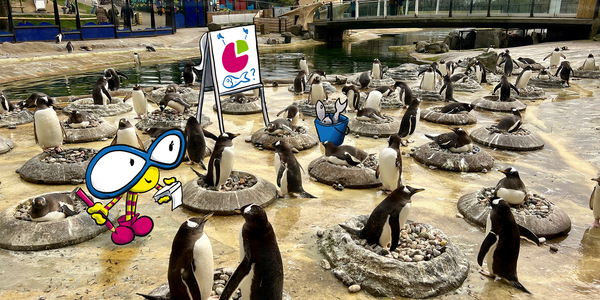


Create an Economy
Best suited for Second and Third Level
During Maths Week set up a classroom economy system with your class, to teach children financial responsibility through fun, experiential learning.

Fionn Finity agus Slighe Matamataig an Sù
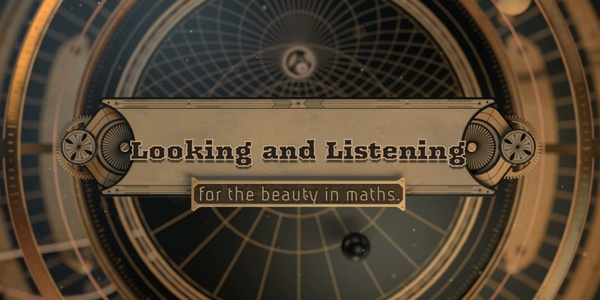
Looking and Listening for the Beauty in Maths
Best suited for Second and Third/Fourth Level
This series of five videos focuses on the mathematics in Art and Music. Topics covered include rhythm, pentatonic scales, tiling and tessellation, and the works of Piet Mondrian.
Each video is accompanied by a brief description, any web-links referred to in the video and a list of key vocabulary to support planning and preparation.
Created by the Scottish Mathematical Council for Maths Week Scotland 2022
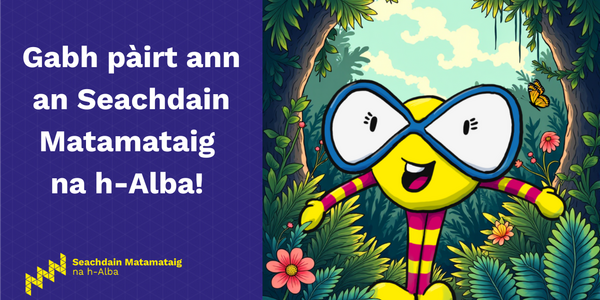
Goireasan Gàidhlig

Women in Maths
Best suited for Second and Third/Fourth Level
Maths Week Scotland interviewed women for whom maths is at the core of their job. Whether it is statistics, bridges or budgets these women rely on maths every single day.
Kids (and adults!) often struggle to identify why maths is useful unless they want to be a maths teacher or banker. Watch these videos together and talk about how maths is important in a huge range of jobs - whatever your interest!
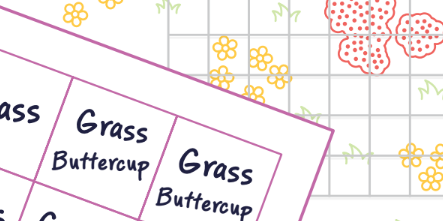
Stats in the Wild
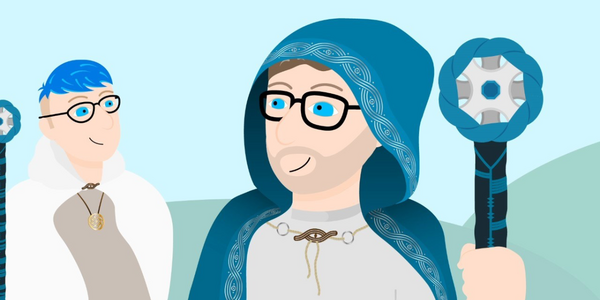
Learn with Will
Best suited for Second and Third/Fourth Level
Learn with Will is a video series of Maths, Science and English. Join Chris and Will on their magical adventures as they bring stone circles to life and summon magical forest spirits, to help you learn about measuring circles.
In Bringing Magic Circles to Life, you'll learn how to measure different parts of a circle, like the radius, diameter, circumference, and area. And in Summon Magical Forest Spirits, you’ll learn how to measure more parts of a circle, like the arc and sector. And there's worksheets to download too, if you want to keep practicing.
Content by Learn with Will

How Many Penguins?
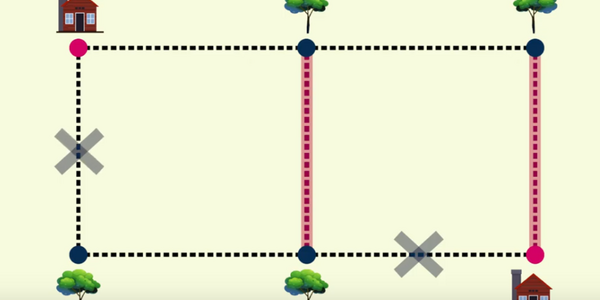
University of Edinburgh Strategy Games
Best suited for Second and Third/Fourth Level
This collection of resources for P5 to S3 students by the University of Edinburgh focuses on strategy games and some applications of Mathematics to transport networks. The aim is to develop mathematical thinking and problem-solving skills, as well as exploring the creative and fun side of mathematics. All resources, including explanatory videos, a range of games and puzzles, and tips for teachers/parents can be found via the link below.
Produced in partnership with Maths Week Scotland
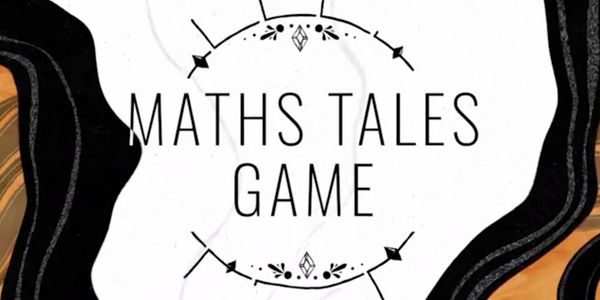
Maths Tales RPG
Best suited for Second Level and above
This RPG game about maths in Ancient Egypt was developed by Daisy Abbott from Anderston Primary Parent Council, for Maths Week Scotland 2024. It covers various maths topics.
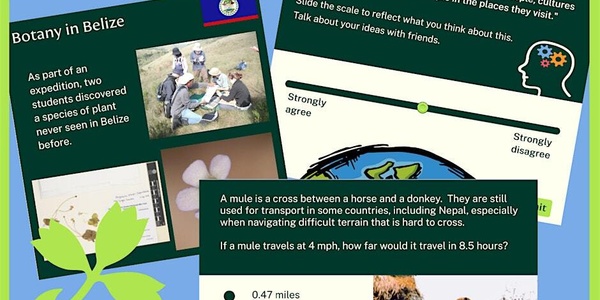
Exploring Maths and Topical Science through Botanical Expeditions
Best suited for Third Level
Explore Maths and Topical Science through botanical expeditions past and present. Take a global citizenship approach to learning about speed, distance and time - and apply this approach to Topical Science too.
The videos and tasks use historic and contemporary examples of expeditions undertaken to add to the Royal Botanic Garden Edinburgh's collection of 3 million pressed plant samples stored in its Herbarium.
These resources can be used within Third Level Maths and Third Level Science/Biology - or together as part of an interdisciplinary learning project.
The resources were created in partnership with Scotdec and made possible by the Maths Week Scotland Large Grants Fund and The National Lottery Heritage Fund.
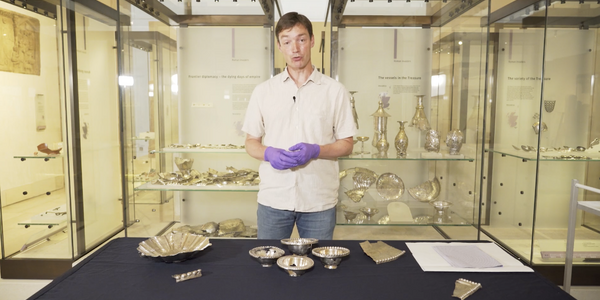
Roman Hackers
Best suited for Third/Fourth Level
This resource are aimed at lower secondary pupils and helps learners explore the role of maths in the hacksilver discovered from the Roman empire.
Watch the video to find out how Museum Curator Dr Fraser Hunter uses maths to uncover the stories behind these hacked up treasures. Learn more with our Roman Hackers resource (download below), which guides pupils to create and hack up their own silver vessels.
Created by National Museums Scotland for Maths Week Scotland 2021

Issue to action: Maths
Best suited for Third/Fourth Level
These resources offer maths teams an opportunity to take an applications approach within the BGE phase. The materials explore 3 broad themes – climate change, gender equality and migration – with 2 sets of activities for each theme supported with a PowerPoint presentation.
Created by Scotdec

How Many Penguins
Best suited for Third/Fourth Level
Introduce your pupils to the concept of populations and samples by taking on the role of an Antarctic scientist calculating penguin populations.
Developed by the Royal Statistical Society.

Navigating Our World
Best suited for Third/Fourth Level
Navigating our World has been developed by the Learning and Engagement Team at Dynamic Earth, with funding from Maths Week Scotland, to highlight the maths in the world around us and relate it to topics such as outer space, map reading, and world history.
In this workshop we give an introduction to navigation; discuss the history and uses of latitude and longitude; visit Edinburgh’s One O’clock Gun and discuss the speed of sound; look at how satellite navigation works; and wrap it all up with a timeline of the entire history of navigation. Ideal for learners working across second-fourth level and can be access in a modular and on-demand way through videos and downloadable resources in your classroom

Maths in Motion: DYW Online Talks
Best suited for Third/Fourth Level
To celebrate Maths Week Scotland 2023, DYW Live held a day of live webinars on the theme of 'maths in motion', featuring:
- Professor of Mathematics talking about their journey to becoming a STEM Ambassador.
- Stream Marine Careers talking about the maths required to work at sea sailing on ships and boats.
- Firstbus explaining how maths is core to their business from ticket prices to timetabling to how many buses and drivers they need.
- A consultant for the energy sector will explain how maths is crucial to her work.
Replays of all talks are available to watch on the e-sgoil website.

Maths Tales: DYW Online Talks
Best suited for Third/Fourth Level
To celebrate Maths Week Scotland 2024, DYW Live held a day of live webinars on the theme of 'maths tales', featuring:
- Hans Unkles, fisherman and boat builder
- Eliza Ralph, founder of Spectral Wrender
- Mary Sowter, mechanical engineering student
Replays of all talks are available to watch on the e-sgoil website.
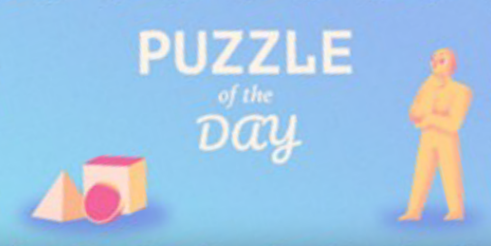
Maths Week at Work: Careers in Maths
Best suited for Third Level and above
A series of videos produced by the University of Edinburgh in collaboration with Maths Week Scotland, where five Maths graduates working in different sectors explain how they use mathematics in their job. Each of them also challenges us with a puzzle which is somehow related to their work. A solution to each puzzle is also presented.
The videos, together with handouts and solutions to the puzzles can be found via the link below.
Produced by Francesca Iezzi and Aarol Films.

Careers Carnival
Best suited for Third Level and above
Head over to the Careers Carnival for pre-recorded videos of STEM Ambassadors about their careers in maths, engineering and space amongst others! The videos have been developed for secondary-aged pupils but some might also be suitable for P6/P7 pupils.

Stats in the Wild
Best suited for Third Level and above
This set of bespoke evidence-based resources are for exploring statistics using outdoor maths, and includes three lessons: Creature Features, Wings and Things, and Flora Explorer.
The lesson resources can be done in any order and are suitable for students aged 11-16.
Produced by Dr Lucy Rycroft-Smith and Darren Macey as part of Maths Week Scotland 2025.

Maths for Climate Change
Best suited for Third Level and above
Maths skills are at the heart of understanding climate change, understanding people’s responses to climate change and developing solutions – whether those are for preventing climate change, or adapting to it. Learn how you can use the Royal Meteorological Society new Climate Change Concept Tool, to support maths in the curriculum.
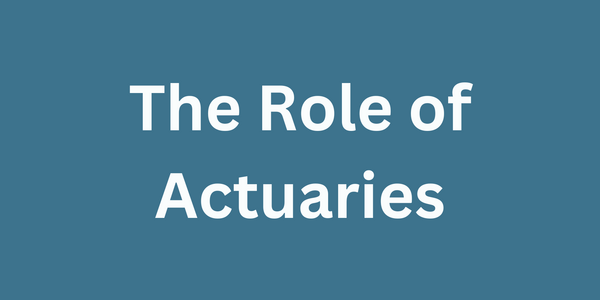
The Role of Actuaries
Best suited for Third Level and above
Discover how problem solvers and critical thinkers unpick problems and tackle issues such as climate change and cyber risk, in this series of short videos.
Created by Institute and Faculty of Actuaries
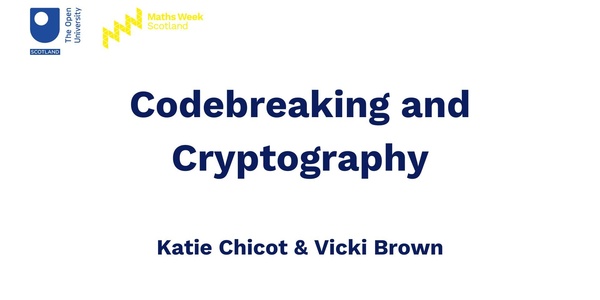
Online Talk: Code Breaking & Cryptography
Best suited for Third Level and above
Watch the replay of the Code Breaking and Cryptography interactive talk from Maths Week Scotland 2022. Join Katie Chicot and Vicki Brown on a whistle stop tour of historical codes, where you will learn to make and break codes and see how cryptography is used today.
Hosted by the Open University